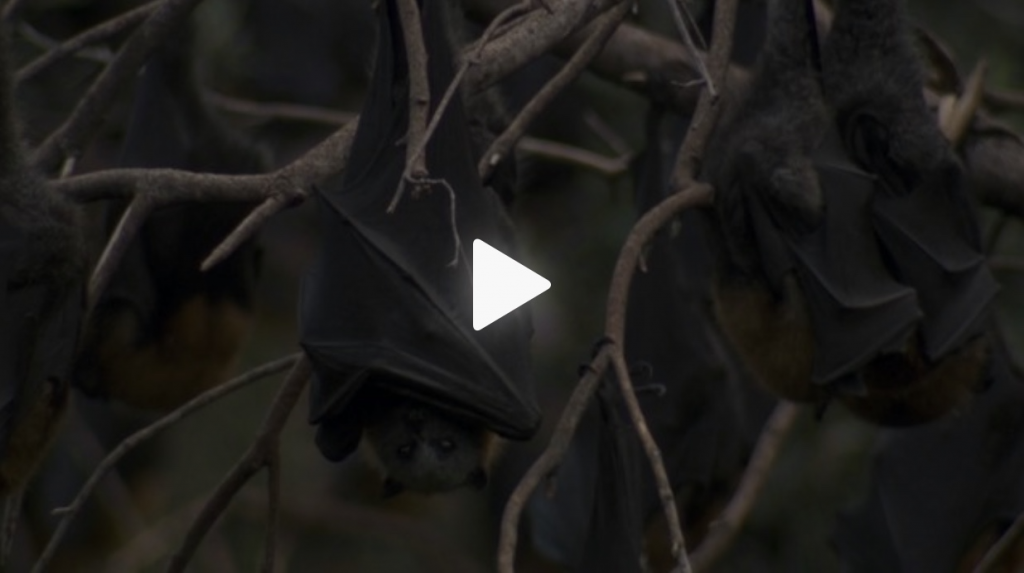GLOBO TV (BRAZIL)
At Sydney Bats, we’re often approached by journalists and film crews, seeking information about flying-foxes. Sometimes, this results in articles or documentaries. Here’s one that was filmed for Globo TV in Brazil at Centennial Park camp, Gordon camp, and the Australia Walkabout Wildlife Park at Calga. The video is in Portuguese, but the transcript is provided below in English and can also be downloaded as a text file here (right-click and save file): [Download transcript]
Giant bats over one meter in danger of disappearing
With the felling of forests, giant bats are forming colonies in Australian cities. And now they are threatened with extinction.
In Brazil, it is very common to have encountered bats in big cities. But nothing compares to these clouds of thousands of giant bats that have invaded Sydney, Australia. They are so big that they became known as “flying foxes”. This absurd amount of bats is more proof of an ecological imbalance caused by man.
Sydney, the largest metropolis in Oceania. Five million people, and full of parks that are home to the colourful Australian birds. But the unsuspecting visitor does not suspect that high up in the trees, what seems like strange fruits are creatures of the night in their hours of rest. Giant bats.
So big are they, that when the British arrived there, they thought they were foxes with wings. The name stuck: flying foxes. They weigh a kilogram and measure more than one metre tip to tip of the wings. Just in the Sydney area are more than 200 thousand. But there is no need to be afraid of vampires – these bats like eucalyptus flowers, and fruit.
Tim Pearson knows by name each bat at a shelter for injured animals. “Banksi here lost the tips of her wings and cannot fly,” says Tim Pearson.
Most have been injured by electric shock, trying to hang on to power cables. So they cannot return to the wild.
They stay in the cage and do not touch the wild animals.
The curious animals are fascinated by reporter Paulo Zero’s camera. Tim not only communicates with these animals, he studies their language. A complex sound system especially emitting in the evenings, when they are waking up and socialising among themselves. Often, Tim makes observations on the porch of Jocelyn Chenu. The forest behind the house she lives in has been taken over by a group of 10,000 bats.
Jocelyn Chenu: I spend hours at the kitchen window watching what they do. Sometimes they are quiet. During the breeding season, they are super noisy, with a lot of territorial fights all the time.
Globo TV reporter: How is it for you to live so close to them?
Jocelyn Chenu: I am a person who is interested in all kinds of wildlife. It is nature, and does not bother me.
Bats are migratory. But with the felling of forests, they are forming colonies in cities.
“Despite this huge amount in the cities, the flying foxes are considered a threatened species. In fact, their numbers are falling” says Tim Pearson.They stay in the city because there, with the introduction of new species of flowers and fruits, they have food all year.
Tim makes Banksi spread her wings to show where are the breasts. Up close we realise how they have five digits on hands and feet. The wings are thin membranes between the fingers.
And it is the power of these wings that the health of the forests of eastern Australia depend on. With the simple act of feeding, the bats sow seeds and pollinate the plants.
“Their favourite food is the eucalyptus flower. They lick the nectar, and as they do their fur gets covered in pollen. As they fly up to 50 kilometres in one night, they are very efficient pollinators” says Tim Pearson.
The night is coming. The flying foxes begin to get active. The sun goes down and they leave. In several parts of the city, bats cloud out the sky. This species has no echo sounder, like other bats. But they have eyes that see in the dark and an extremely keen sense of smell.
The scene, so common in horror movies, is really a guarantee of life. While bats are nearby, they are helping forests and all the life they support.
The original page in Portuguese is available at: http://glo.bo/1MHJb5A
